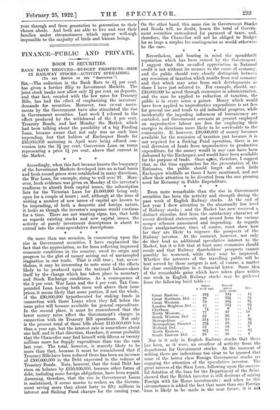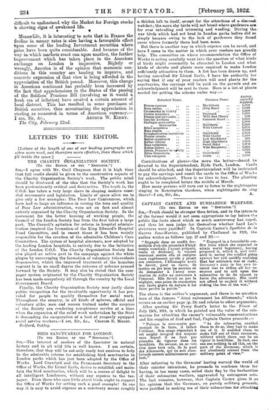FINANCE-PUBLIC AND PRIVATE.
BOOM IN SECURITIES.
BANK RATE REDUCED—BUDGET PROSPECTS—RISE IN RAILWAY STOCKS—ACTIVITY SPREADING. [To nu EDITOR OF THE "SPECTATOR.")
Snt,—The reduction in the Bank Rate to 41 per cent. has given a further fillip to Investment Markets. The joint stock banks now allow only 2f per cent. on deposits, and that fact, coupled with the low rates for Treasury Bills, has had the effect of emphasizing the investors' demands for securities. Moreover, two resent move- ments by the Government have also stimulated the rise in Government securities. Last week I referred to the effect produced by the withdrawal of the 5 per cent. Treasury Bonds, and last Monday the Market, which had been talking about the possibility of a big Funding Loan, became aware that not only was no such loan impending, but that holders of Exchequer Bonds for 05,000,000 maturing in April were being offered con- version into the 3 per cent. Conversion Loan on terms representing a price lf per cent. above that current in the Market.
4, Accordingly, when this fact became known the buoyancy of the Investment Markets developed into an actual boom and fresh record prices were established in many directions, the War Loan, for example, rising to well over 97. More- over, fresh evidence was given on Monday of the investor's readiness to absorb fresh capital issues, the subscription lists for the Victorian Loan for £4,000,000 being only open for a couple of hours ; and, although at the time of writing a number of new issues of capital are known to be impending, of both a domestic and foreign nature, it looks as though the investor's response would continue for a time. There are not wanting signs, too, that both as regards existing stocks and new capital issues, the activity of purely investment descriptions is about to extend into the semi-speculative descriptions.
On more than one occasion, in commenting upon the rise in Government securities, I have emphasized the fact that the appreciation, so far from reflecting improved economic conditions in the country, owed its origin and progress to the glut of money arising out of unexampled stagnation in our trade. That is still true ; but, never- theless, it may be interesting to note some of the effects likely to be produced upon the national balance-sheet itself by the change which has taken place in monetary and Stock Exchange conditions. As a consequence of the 5 per cent. War Loan and the 4 per cent. 'Tax Com- pounded Loan having both risen well above their issue prices, it seems likely that some portion, if not the whole, of the 00,000,000 hypothecated for sinking funds in connection with those Loans when they fall below the issue price will become available for general expenditure. In the second place, it must be remembered that the lower money rates affect the Government's charges in connection with its Treasury Bill operations. Not only is the present total of those bills about 1140,000,000 less than a year ago, but the interest rate is somewhere about one half, and in that direction, therefore, it seems probable that the Chancellor may find himself with fifteen or twenty millions more for Supply expenditure than was the case last year. The total, however, is scarcely likely to be more than that, because it must be remembered that if Treasury Bills have been reduced there has been an increase of 000,000,000 in the Debt expressed in the volume of Treasury Bonds. Note, however, that the total Debt has risen on balance by £150,000,000, because other forms of debt, including some foreign obligations, have been repaid. Assuming, therefore, that the rise in Government Loans is maintained, it seems unwise to reckon on the Govern- ment saving more than about forty to fifty millions in interest and Sinking Fund charges for the coming year. On the other hand, this same rise in Government Stocks and Bonds will, no doubt, lessen the total of Goven- merit securities surrendered for payment of taxes, and, therefore, the Chancellor will not be obliged to Budget for so large a surplus for contingencies as would otherwise be the case.
Nevertheless, and bearing in mind the spendthrift reputation which has been earned by the Government, I suggest that this so-called appreciation in National credit is not without its menace to the cause of economy, and the public should very clearly distinguish between any remission of taxation which results from real economy and that which may arise from such developments as those I have just referred to. For example, should, say, 00,000,000 be saved through economies in administration, and the sum be applied to reduction of taxation, the public is in every sense a gainer. Money which would have been applied to unproductive expenditure is set free for general use and tends to aid industrial progress, while incidentally the impeding influences of bureaucracy are curtailed, and Government servants at present employed on unproductive labour are free for employing their energies in directions more likely to be serviceable to the community. If, however, 00,000,000 of money becomes available for the remission of taxation just because it is not required for a Sinking Fund operation, there is no real diversion of funds from unproductive to productive expenditure, for the money would in any case have been disbursed by the Exchequer, and would have been available for the purpose of trade. Once age.in, therefore, I suggest that, as the time approaches for the presentation of the Estimates, the public should forget all such little Exchequer windfalls as those I have mentioned, and not allow their attention to be diverted from the one pressing need for Economy in Public Expenditure.
Even more remarkable than the rise in Government securities has been the activity and strength during the past week of English Railway stocks. At the end of last year I drew attention to the abnormally low level of Railway stocks • and the Market has now received a distinct stimulus, first from the satisfactory character of recent dividend statements, and second from the various merger schemes announced and impending. As regards these amalgamations, time, of course, must show how far they are likely to improve the prospects of the Railway investor. At the moment, however, not only do they lend an additional speculative interest to the Market, but it is felt that at least some economies should result and that Railway shareholders' prospects cannot possibly be worsened, while they may be improved. Whether the interests of the travelling public will be best served by these mergers is not, of course, a matter for close consideration in a financial letter. Some idea of the remarkable gains which have taken place within one week in English Railway stocks may be gathered from the following brief table :— Prices a week ago.
Present prices
Great Eastern .. 294
(Feb3.4242nd)..
Great Northern Def. ..
28 .
. 334 . .
51 Great Western .. 79 881
91 London Brighton Def... 45 511 • . 61 Chatham ..
North Western.. .. 71 77 9 87 • . 10 South Western Def. .. 22 26
4 Metropolitan .. .. 311 35 • •
31
Metropolitan District .. 231 .. 26.
21 Midland Def. .. .. 52 .. 58
North Eastern .. .. 821 .. 91
81
South Eastern Def. .. 26 .. 30
4
Nor is it only in English Railway stocks that there has been, as it were, an overflow of activity from the department for Government stocks. At the moment of writing there are indications too clear to be ignored that some of the better class Foreign Government stocks are engaging the attention of the speculative investor. The great success of the Siam Loan, following upon the success- ful flotation of the loan for the Department of the Seine, showed that the British investor is still desirous of mixing Foreign with his Home investments ; and. when to this circumstance is added the fact that more than one Foreign loan is likely to be made in the near future, it is nob difficult to understand. why the Market for Foreign stocks showing! signs. of awakened life.
4:
Meanwhile, it is interesting to note that in. France- the decline. in. money rates is also. having, a. favourable effect Upon some of the leading Investment securities- where. 'gains have been quite considerable. And because of the way in, which markets .react one:upon another,. the further Improvement which has taken. place. in the American exchange an London is impressive. Rightly or *wrongly, America is of the opinion that economic con- ditions_ in this country are tending to improve, and concrete expression of that view is being, afforded in the appreciation of the British pound. Moreover, this; change in American. sentiment has probably been increased by the fact that apprehensions in the States of the passing of the Soldiers' Pensions Bill. (involving as it would a fresh era of inflation) have created a certain amount of local distrust. This has resulted in some purchases of British securities, thus. accentuating the appreciation, in sterling as measured, in. terms. of American currency,—



































 Previous page
Previous page